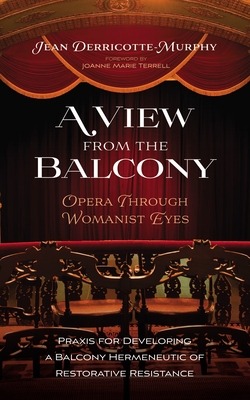A View from the Balcony--Opera Through Womanist Eyes: PRAXIS for Developing a Balcony Hermeneutic of Restorative Resistance

A View from the Balcony--Opera Through Womanist Eyes: PRAXIS for Developing a Balcony Hermeneutic of Restorative Resistance
In this theological work, readers are seated in a metaphorical balcony as a counter melody is composed within America's operatic tradition. By using imaginary opera glasses, readers are invited to critically view American society and history. The most popular folk songs of white Southerners, Western settlers, and Northern elites were composed from chords of colonialism, white supremacy, patriarchy, hegemony, and xenophobia--forms of anthropological poverty. These songs were, and remain, the most discordant melodies heard by indigenous and enslaved persons in America. Indicting the "church" for its complicity in these oppressions, this work offers the reader a historical glimpse at the philosophical and religious underpinnings of systemic racism. A new healing hermeneutic, the balcony hermeneutic, enables the reader to view, critique, assess, correct, and reverse the devastating consequences of anthropological poverty. By taking a "reversed gaze" of traditional Western Eurocentric systems of knowledge production, through theomusicology, this work privileges the voices of indigenous scholars--philosophers, anthropologists, theologians, and performers--to sing a new song as we correct negative narrative
PRP: 310.00 Lei
Acesta este Prețul Recomandat de Producător. Prețul de vânzare al produsului este afișat mai jos.
279.00Lei
279.00Lei
310.00 LeiIndisponibil
Descrierea produsului
In this theological work, readers are seated in a metaphorical balcony as a counter melody is composed within America's operatic tradition. By using imaginary opera glasses, readers are invited to critically view American society and history. The most popular folk songs of white Southerners, Western settlers, and Northern elites were composed from chords of colonialism, white supremacy, patriarchy, hegemony, and xenophobia--forms of anthropological poverty. These songs were, and remain, the most discordant melodies heard by indigenous and enslaved persons in America. Indicting the "church" for its complicity in these oppressions, this work offers the reader a historical glimpse at the philosophical and religious underpinnings of systemic racism. A new healing hermeneutic, the balcony hermeneutic, enables the reader to view, critique, assess, correct, and reverse the devastating consequences of anthropological poverty. By taking a "reversed gaze" of traditional Western Eurocentric systems of knowledge production, through theomusicology, this work privileges the voices of indigenous scholars--philosophers, anthropologists, theologians, and performers--to sing a new song as we correct negative narrative
Detaliile produsului









